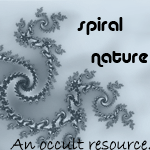Nietzsche on Art
By Psyche | December 9, 2007 | Print This Post | E-mail This Post | 1 Comment
I’ve been reading Nietzsche’s The Genealogy of Morals, and a passage in the third essay, “What is the meaning of aesthetic ideals?” intrigued me:
…[I]t is certainly best to separate an artist from his work so completely that he cannot be taken as seriously as his work. He is after all merely the presupposition of his work, the womb, the soil, in certain cases the dung and manure, on which and out of which it grows – and consequently, in most cases, something that must be forgotten if the work is to be enjoyed.
Nietzsche is writing specifically about Wagner here, but the sentiment can be positioned to apply to any artist one finds objectionable whose work one might appreciate were their “character” not at odds with an expected ideal. It strikes me that this approach is often taken in regards to Crowley’s works in particular, especially for those who might otherwise be reluctant to dare engaging in the material.
We do indeed find this attitude with many “serious” occultists, and even Thelemites, who mock Crowley while promoting certain books (especially Magick in Theory and Practice, Magick Without Tears, etc.) and catchphrases (“Magick is the art and science of causing change in conformity with Will”, “Do what thou wilt shall be the whole of the Law”, “Love is the law, love under will”, etc.).
Nietzsche writes:
The insight into the origin of a work is a matter for psychologists and vivisectors, but never either in the present or future of the aesthetes, the artists.
While the artist can lacks perspective to view hirself in context of the work produced, no-one is better suited to explain the creative process or sources of inspiration that are recognized. Thus, the artist hirself can be a source, though further myth-making is to be expected.
However, viewing a work without any context seems even more suspect. Is it truly possible to appreciate a work without understanding what inspired it? If one is not familiar with Dali’s fascination with the rocks at Cap de Creus, will the images it repeatedly inspired in works such as “The Enigma of Desire”, “Portrait of Pal Eluard”, “Illumined Pleasures”, “The Persistence of Memory” and so on, contain the same resonance? Is one really capable of demonstrating an understanding of the works without background knowledge of the artist who gave them life?
He continues:
We must guard ourselves against the confusion, into which the artist himself would fall only too easily (to employ English terminology) out of psychological “contiguity”; as though the artist himself actually were the object he is able to represent, imagine and express. In point of fact, the position is that even if he conceived he were such an object, he would certainly not represent, conceive, express it.
While I sympathize with the desire to interpret a work independent of its creator, doing so exclusively, without also considering in context seems greatly lacking. Certainly, works can be greater than their originators, but whether “channeled” or deliberate, the creator’s self is an inherent component of what has been produced. It seems ignorant to ignore this simple fact.
In occult circles today Crowley is still known as “the wickedest man in the world” and often presumed to be an “evil man” by those who don’t bother to read the works, or practice the material he advocated. The biographies don’t generally alleviate this view, nor should they, but neither do they seem to explore the relationship between the man and his work in a way that demonstrates appreciation for what he accomplished, unless it’s to begrudge him for “failing miserably” despite a “promising start”.
When all works are necessarily expressions of self, I wonder at the usefulness of dismissing the artist who created the work from the result. It certainly doesn’t add anything to an interpretation. Rather, it seems foolish to deliberately neglect a study of and attempt at understanding the circumstances which gave rise to something one claims to be serious about.
If you enjoyed this subscribe to the RSS feed!
What is RSS?





[...] we looked at being “beyond the books“, Nietzsche on art, book reviews and a number of news items (such as being among the first to report the sad news that [...]